Hole in the Clouds
Nov 19, 2010
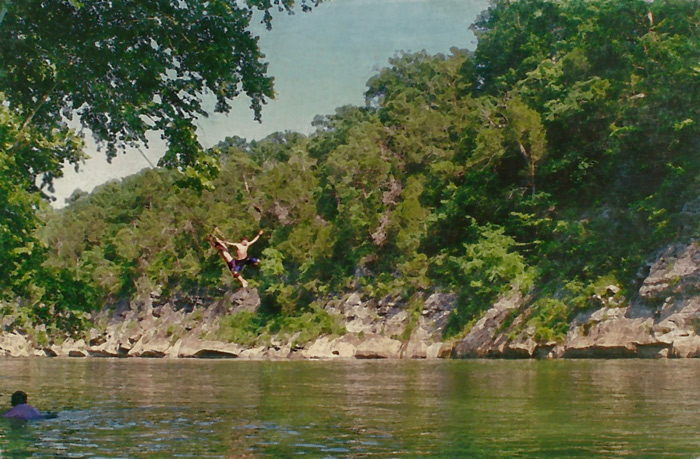
About twenty years ago, we went paddling round a bend in the Little Cahaba River near Montevallo, Alabama, and came upon this rope swing. It looked like fun, but even twenty years ago I was a boring old lady without the gumption to give it a try.
Alabama
Little Cahaba River
boys
rope swing
swimming
Jan 9, 2011
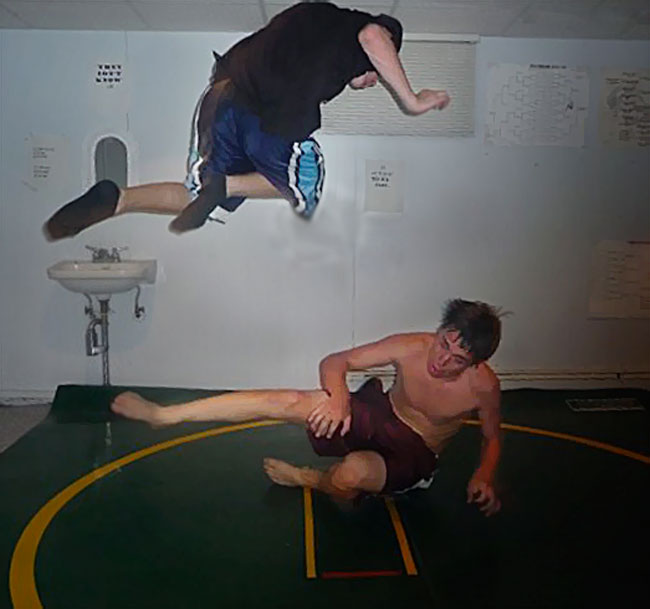
The kids used to have their friends over, and they'd go down in the basement and rassle and stuff. They're all grown up now, more or less; they're not living at home any more, and so we sold the house. Basement and all.
Maine
wrestling
boys
basement
Nov 14, 2011
 They're up to something.
They're up to something.
Hank
Philadelphia
kitchen
boys
JJ
Steins
Feb 9, 2012
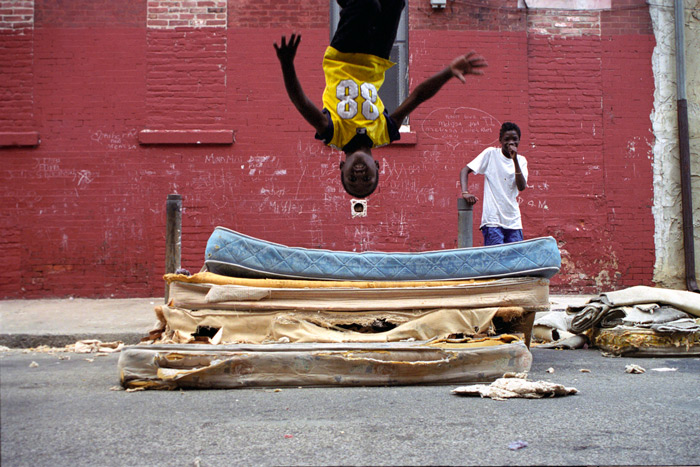 It was a way to spend a summer afternoon in South Philly in 2001, doing flips off a pile of discarded old mattresses. The photographer who happened by, Zoe Strauss, originally stopped to caution the boys: Don't do that. You're gonna kill yourselves. They told her not to worry and offered to do even more daredevilish stunts for her camera. She snapped a few pictures and then took off, anxious, perhaps, that her picture-taking might be upping the danger level.
It was a way to spend a summer afternoon in South Philly in 2001, doing flips off a pile of discarded old mattresses. The photographer who happened by, Zoe Strauss, originally stopped to caution the boys: Don't do that. You're gonna kill yourselves. They told her not to worry and offered to do even more daredevilish stunts for her camera. She snapped a few pictures and then took off, anxious, perhaps, that her picture-taking might be upping the danger level.
The boy in the back in this photo, Lawrence Edward Rose, Jr., has his hand in front of his face, as if in astonishment at what the other boy, his cousin Botie, was up to. Actually, his fist was at his mouth because he was sucking his thumb; he was thirteen years old that summer, but he was a shy, quiet boy who continued to suck his thumb till he was seventeen.
The summer he turned nineteen, six years almost to the day after the mattress flipping, he died from complications of gunshot wounds suffered in a gang fight at a corner store a few blocks from where those mattresses had been piled. His mother had feared for her timid boy who smiled at everybody and still sucked his thumb as a teenager; to keep him off the streets, she had enrolled him in every program she could find, even sending him to two different boarding schools. But it seemed he was a homebody who wasn't comfortable away from his family and his neighborhood, and in July 2007, the street claimed him.
The photo had a life of its own. Zoe Strauss made several prints, which she exhibited at a show she mounted every year underneath an I-95 interchange in South Philly. Under the highway, the prints sold for $5. Later, she printed larger versions on fancy paper for a New York gallery that sold them for $3,000. More recently, a billboard-sized print of the mattress flip has hung over the main entrance to the Philadelphia Museum of Art, announcing a mid-career retrospective show of Strauss's work.
It's also part of the cover design of an ABC picture book published by the Philadelphia Museum of Art, which is how librarian Sa'ddiya Suku came across it last year at a branch library in West Philly. She didn't know the children in the scene, but she had grown up at the corner where the picture was shot, and she recognized the red-painted brick wall behind the mattresses. And then she recognized the thumb-sucking child standing near the wall, from pictures she'd seen and stories she'd heard after his death.
Suku showed the picture to Rose's family; they were thrilled, she said, to learn that the boy was part of history. He's gone, but he lives on; the photo is about nothing so much as the joy of being young and alive.
cityscape
streetscape
boys
South Philly
Lawrence Edward Rose Jr.
flip
Sa'ddiya Suku
(Image credit: Zoe Strauss)
Feb 19, 2012
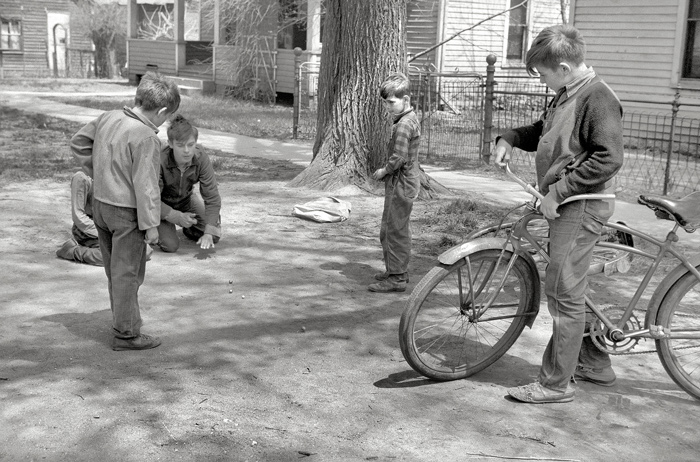 Boys playing marbles in May 1940, in Woodbine, Iowa. I don't know when exactly American children gave up marble-playing, but by the late 1950s, when I was a serious student of childhood fun in America, nobody played with marbles any more.
Boys playing marbles in May 1940, in Woodbine, Iowa. I don't know when exactly American children gave up marble-playing, but by the late 1950s, when I was a serious student of childhood fun in America, nobody played with marbles any more.
They still rode bikes, however. And there were other games in which you could lose all your stuff, such as flipping baseball cards.
In 1940, Woodbine, Iowa, was a relatively prosperous place, center of Iowa's apple-growing industry, which was the second-largest in the nation. But a freak blizzard in the early fall of that year, about six months after this picture was taken, froze the trees before summer's new growth had hardened off; all but the very oldest trees turned black and died, and Woodbine never really recovered economically.
children
streetscape
boys
bike
1940
marbles
games
Woodbine
Iowa
(Image credit: John Vachon, Farm Security Administration, via Shorpy)
Mar 6, 2012
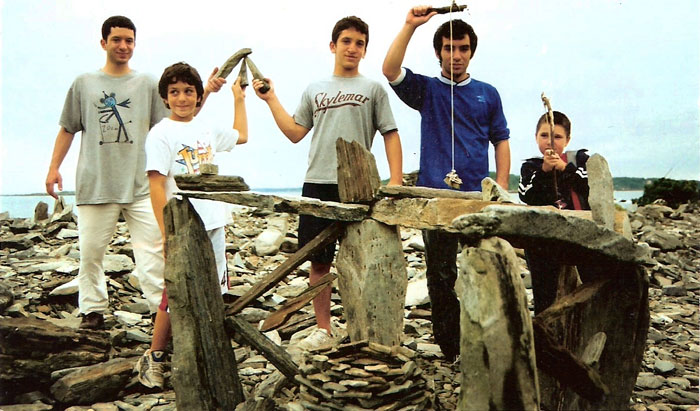 In August 2004, during a family gathering on Peaks Island, Maine, to celebrate my father's eightieth birthday, some of the grandchildren spent many hours doing stuff with the rocks on the beach. Here we see Ted, Hank, Allen, Joe, and their cousin Nick.
In August 2004, during a family gathering on Peaks Island, Maine, to celebrate my father's eightieth birthday, some of the grandchildren spent many hours doing stuff with the rocks on the beach. Here we see Ted, Hank, Allen, Joe, and their cousin Nick.
If I remember correctly, shortly after this picture was taken, something catastrophic happened to the structure. The catastrophe was great fun for some of the boys, but not so much fun for Hank, who felt compelled to devote more hours to "fixing" it.
family
Peaks Island
Nick Horowitz
rocks
Joe
Ted
Allen
Hank
boys
Aug 19, 2014
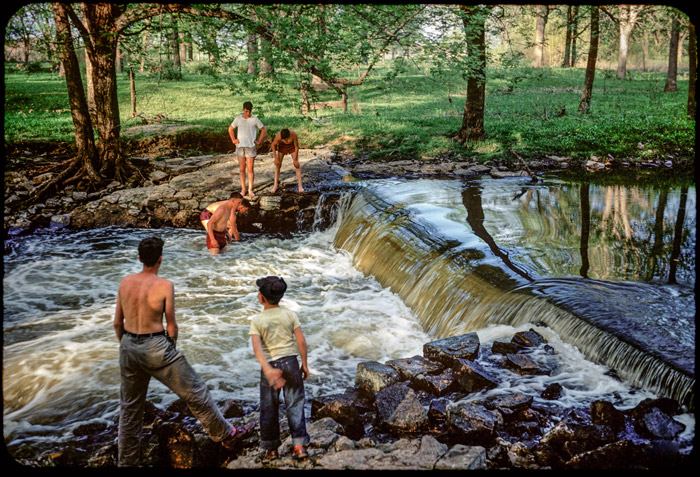 Somewhere near this scene, just out of camera range, there's probably an old inscription scratched by a pocketknife into a barn rafter: "Norman Rockwell was here."
Somewhere near this scene, just out of camera range, there's probably an old inscription scratched by a pocketknife into a barn rafter: "Norman Rockwell was here."
It's Minnesota in the springtime. You can tell it's Minnesota because the little boy with his back to the camera is still wearing his winter hat, with the earflaps folded up.
The photographer is not known, but there's a caption written on the Kodachrome slide: "Dam at Blue Earth, just below the cemetery, May 4, 1952."
Minnesota
boys
swimming
creek
springtime
dam
Blue Earth
(Image credit: unknown)
Dec 14, 2014
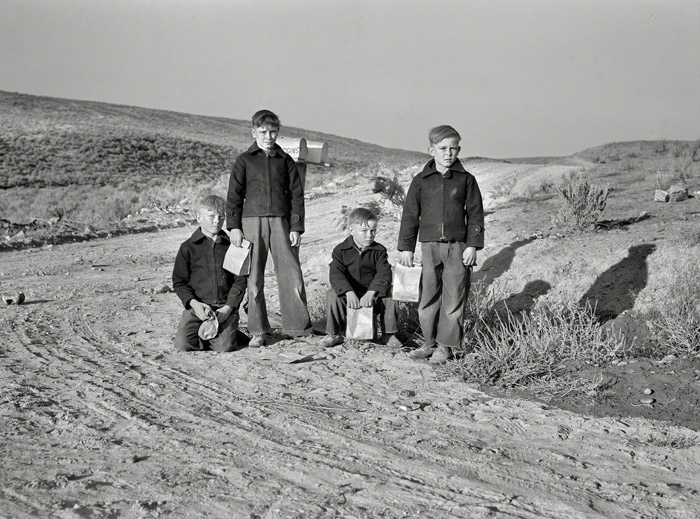 "Boys from Dead Ox Flat waiting for the school bus in the morning. Malheur County, Oregon."
"Boys from Dead Ox Flat waiting for the school bus in the morning. Malheur County, Oregon."
Dorothea Lange took this picture in October 1939 for the Resettlement Administration. During the mid-1930s, the desert country of eastern Oregon and southwestern Idaho attracted thousands of Dust Bowl refugees seeking construction work on the Owhyee dam and irrigation project; as the project came on line between 1935 and 1939, thousands more refugees sought agricultural work on the newly irrigated cropland.
The name on the mailbox behind the boys is revealed in another of Lange's photos of the same scene: H.E. Hudgins. According to the 1940 census, Herbert and Jessie Hudgins lived thereabouts--but with only two children, an eleven-year-old girl and a six-year-old boy. Herbert Hudgins worked as a ditch rider, assigned to travel the length of the new canals and laterals, cleaning out debris and opening and closing the check boards that control the flow of water to different growers' acreage.
The boys look to be wearing new clothes and fresh haircuts, perhaps because the photo was taken on the first day of a new school year. The picture is dated from the month of October, but this was a time and place where school would not begin until after the year's harvest was in.
landscape
children
streetscape
Oregon
boys
H.E. Hudgins
lunchbags
Malheur County
(Image credit: Dorothea Lange via Shorpy)
Feb 10, 2016
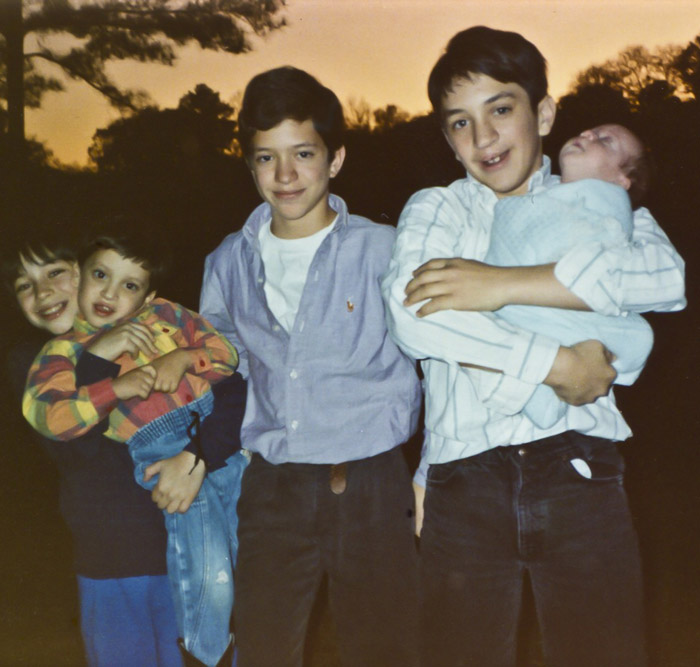 This is the earliest known photo of all five boys, taken at Forest Lake, Tuscaloosa, in November or December of 1992.
This is the earliest known photo of all five boys, taken at Forest Lake, Tuscaloosa, in November or December of 1992.
For what it's worth, all the trees in the background are gone now, shredded by the tornado in 2011. The boys, however, are still going strong: from left to right, there's Joe, now 34; Allen, 27; Ted, 36; John, who just turned 38; and bobble-headed newborn Hank, who's now 23.
Tuscaloosa
Alabama
sunset
John
Joe
Ted
Allen
Hank
boys
Steins
Mar 29, 2017
 Don't know these kids, just caught a glimpse in passing. One of them plopped himself down on a skateboard and hitched a ride through the airport behind the suitcase being pulled by the other kid. They could be brothers. I'm pretty sure they're the kind of kids that people call A Handful. Especially the one on the skateboard.
Don't know these kids, just caught a glimpse in passing. One of them plopped himself down on a skateboard and hitched a ride through the airport behind the suitcase being pulled by the other kid. They could be brothers. I'm pretty sure they're the kind of kids that people call A Handful. Especially the one on the skateboard.
kids
boys
skateboard
playing
Sea-Tac Airport
suitcase
(Image credit: the phone)









